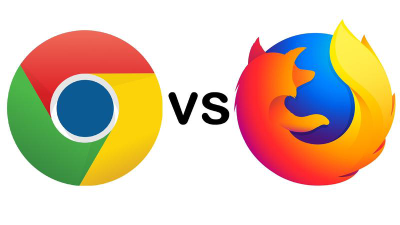Firefox Quantum vs Google Chrome
Highlights:
Chrome vs Firefox: Usage of System Resources
Google Chrome has been guilty of using more memory, disk space, and processor time compared to Mozilla Firefox. You can test this on your own by opening same windows, same tabs in each browser and then opening Task Manager in Windows 10. With Google Chrome, you get precise information if you use Chrome Task Manager. The Chrome Task manager is available under Menu (Three vertical dots) -> More Tools -> Task Manager. The Google Chrome Task Manager shows how each tab and extension is using memory and processor. See the image below to get an idea of how it looks. You can add up the variables such as the RAM usage, processor usage, and then compare them to the sum of variables as they appear in Windows 10 Task Manager. That would give you a clear idea of how much resources is Chrome holding. There is no Task Manager in Firefox. You have to depend on Windows 10 Task Manager to find out the total RAM, PROCESSOR, DISK USAGE, etc. variables being used by Firefox. You can then compare Google Chrome with Mozilla Firefox to see which one is consuming how much resources. Since there is no customized Task Manager or anything similar in Mozilla Firefox, you cannot know the exact amount of resources (RAM, PROCESSOR TIME) being used by different extensions and other elements of the Firefox browser. The best method to find the total consumption of RAM, DISK USAGE, etc. is to add up the values of these variables few times like three times or five times. Then use their average values for comparison. You’ll find Google Chrome taking up more DISK SPACE and PROCESSOR while Firefox comes higher in the usage of RAM.
User Interface
Mozilla has come a long way in redesigning its user interface else there was a time I couldn’t use the browser as it was pretty difficult to figure out how to locate bookmarks etc. All that is changed now. Google Chrome too has changed a lot in the past few years, but it still lacks ease of navigation. It has three vertical dots that open a menu to let users access other options and actions such as Casting any Chrome tab to TV or any other device. Same way, it has an option saying More Tools that contain some other features. In other words, one has to search the extensive menu for getting work done in Google Chrome. There is no way to customize the looks of Chrome. With Firefox, everything is visible on screen, and it uses three bars to indicate the menu – which is more identifiable. Plus, the Customize option lets you arrange, add, remove, and rearrange screen components of Firefox browser so you can keep commands handy.
Summary
The above analysis tends to convey that both Google Chrome and Mozilla Firefox are good in their way. Chrome is suspected to use some tricks to speed up browsing. Firefox code is easily available, so users know there are no such tricks in Mozilla Firefox. Some extensions are built only for Chrome (example VIDIQ for YouTubers), so there is an edge for Chrome over Firefox when it comes to extensions. It doesn’t mean that Firefox lacks extensions. There are all types of extensions for Firefox too but in some cases, some companies restrict their extensions for Chrome only, so that more people use the browser from Google. Also, Google does not want its users to leave Chrome, so it provides many features inside the browser, though the interface is tricky for some. For example, the Cast… option is available in Chrome menu while for Firefox, one has to use related extensions. Thus, both are unique in their own ways. There is little difference among resource consumption and speed when comparing Google Chrome with Mozilla Firefox on Windows 10. Things things have improved a lot with Firefox Quantum. Chrome however appears to have become sluggish at times. The main factors for adopting only one of these browsers depends upon how they are intended to use. Suppose a person uses multiple monitors and wants to cast different tabs to different monitors, the person will use Google Chrome rather than searching for a similar extension for Firefox. Similarly, if a YouTuber uses VIDIQ or some Chrome-only extension for analysis of videos, he or she will have to use Chrome. Otherwise, Firefox is easier to operate. Over to you. Your experience?


